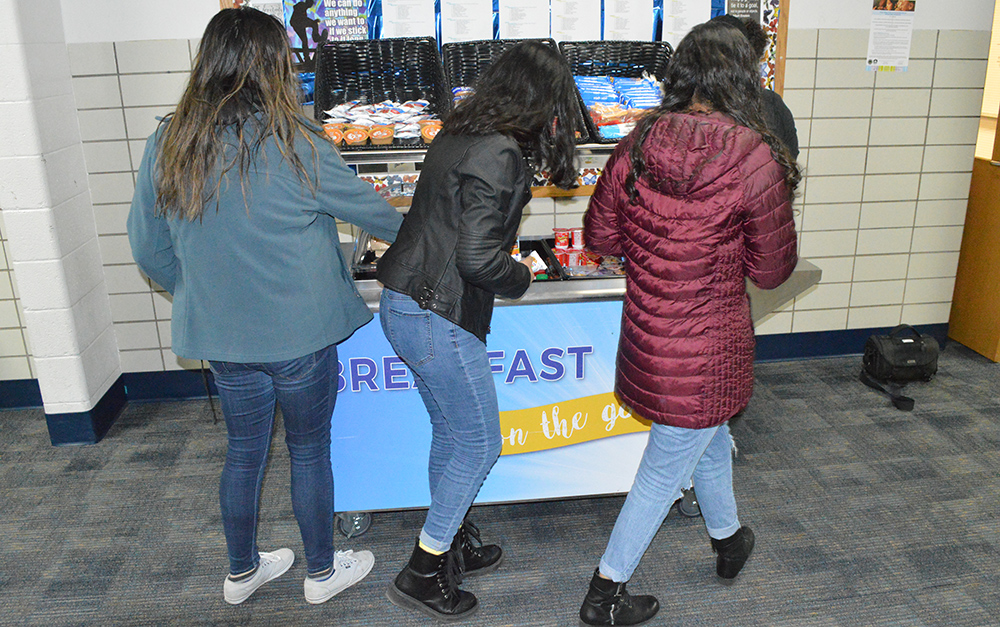Senior Christopher Rivera said he doubled his morning food intake while school was in session, making his day that much better. The reason? Breakfast carts.
“When I was in middle school there were usually long lines of students at the cafeteria and I’d be late to class or skip eating,” said Christopher, president of the high school student council. “You can just grab and go now; it’s very easy and simple. You can bring your food to classes and teachers allow it.”
Godfrey-Lee Dining Services Director Monica Collier, creator of the breakfast cart program last fall, earned a state award for her idea in early March before the mandatory school closure due to COVID-19.
“I noticed that the breakfast (participation) percentage was very low, and my concern was if all the kids eat for free here why are we not able to feed them breakfast?” Collier said. “There was something that was missing, and I was thinking about how unfocused you could be if your belly wasn’t full.”
After administering online and paper surveys throughout the district, Collier said the top answer she found was students are crunched for time, and being late to class meant detention.
She said scattering breakfast carts throughout the building from 7:30 to 8:15 a.m. allowed students to grab a healthy meal or snack in the hall and eat it on the way to class or in class.
“We bought three to see how it would go and honestly it was just a huge turnaround,” Collier explained. “We were able to get a 56% breakfast increase.
“I’m thankful I was able to make an impact on the district. I would like to add another breakfast cart.”

Nutrition Key to Learning
Since schools closed statewide March 16, providing meals to students has been a key concern of local districts. That’s especially crucial in lower-income districts like Godfrey-Lee, where more than 87,000 meals were distributed to students since the closing, said Superintendent Kevin Polston.
Given the importance of good nutrition to learning and attendance, the breakfast cart program earned high recognition at the state level.
Mindy Grant, Michigan Breakfast Program grant manager, said Collier was one of 14 people selected out of 85 nominated to receive the “Breakfast Hero” award.
“It’s great; this is something we’ve been pushing for quite a while now,” Grant said. “We push ‘Breakfast After the Bell,’ which is basically serving kids any way we can, preferably after the bell.
“Research shows that’s when more kids will eat and they get the greater benefit. The fact that Monica did this and it took off the way it did is just incredible. All the kids here qualify for a free lunch and only 12% of the students were eating breakfast.”
Thanks to the cart, Lee Middle and High served 165 more students breakfast every day, Grant said. From breakfast pizza and burritos to cereal bars, granola muffins, fruit, milk, juice, yogurt and parfaits, the students have many choices. They can also throw something in their backpacks for later.

A Handy Meal for Students
Pointing to a recent study conducted on behalf of No Kid Hungry by researchers at the University of California Santa Barbara, Grant said nearly 8 million students a year are considered chronically absent, meaning they miss at least three weeks of school per year. That can contribute to lower academic achievement, greater risk of dropping out and worse employment prospects, according to No Kid Hungry.
“School officials around the nation are focused on finding ways to reduce this number,” she said. “Many schools, however, already have an effective, powerful tool at their disposal – school breakfast.”
- Serving breakfast as part of the school day can reduce chronic absenteeism by an average of six percentage points.
- For context, holding all other factors constant, a school where 22% of students are chronically absent (the average in the schools studied) could see that drop to 16% after implementing Breakfast After the Bell.
- And while the focus of the study was absenteeism, exploratory analysis also found that Breakfast After the Bell led to improvements in reading achievement and “internalizing behaviors,” such as anxiety, loneliness and sadness among students.
Junior Adriana Landis said having the carts available solves a time issue for her.
“If someone’s running late to class you can just quickly grab something and go to class instead of going all the way down to the cafeteria,” said Adriana, who’s spent her entire life in Godfrey-Lee schools.
Junior Francisco Garcia loves the convenience of the carts.
“Each part of the school gets a cart,” he explained. “It’s really inconvenient for me to go all the way to the cafeteria. And it’s a variety of food every day.
“I always get a juice and a breakfast bar; that’s my go-to.”









